Related Research Articles

The Peloponnesian War was an ancient Greek war fought between Athens and Sparta and their respective allies for the hegemony of the Greek world. The war remained undecided for a long time, until the decisive intervention of the Persian Empire in support of Sparta. Led by Lysander, the Spartan fleet, built with Persian subsidies, finally defeated Athens and started a period of Spartan hegemony over Greece.
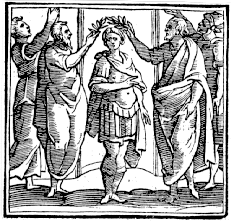
Thrasybulus was an Athenian general and democratic leader. In 411 BC, in the wake of an oligarchic coup at Athens, the pro-democracy sailors at Samos elected him as a general, making him a primary leader of the ultimately successful democratic resistance to the coup. As general, he was responsible for recalling the controversial nobleman Alcibiades from exile, and the two worked together extensively over the next several years. In 411 and 410, Thrasybulus was in command along with Alcibiades and others at several critical Athenian naval victories.

Epaminondas was a Greek general of Thebes and statesman of the 4th century BC who transformed the Ancient Greek city-state, leading it out of Spartan subjugation into a pre-eminent position in Greek politics called the Theban Hegemony. In the process, he broke Spartan military power with his victory at Leuctra and liberated the Messenian helots, a group of Peloponnesian Greeks who had been enslaved under Spartan rule for some 230 years after being defeated in the Messenian War ending in 600 BC. Epaminondas reshaped the political map of Greece, fragmented old alliances, created new ones, and supervised the construction of entire cities. He was also militarily influential and invented and implemented several major battlefield tactics.
Theramenes was an Athenian statesman, prominent in the final decade of the Peloponnesian War. He was particularly active during the two periods of oligarchic government at Athens, as well as in the trial of the generals who had commanded at Arginusae in 406 BC. A moderate oligarch, he often found himself caught between the democrats on the one hand and the extremist oligarchs on the other. Successful in replacing a narrow oligarchy with a broader one in 411 BC, he failed to achieve the same end in 404 BC, and was executed by the extremists whose policies he had opposed.
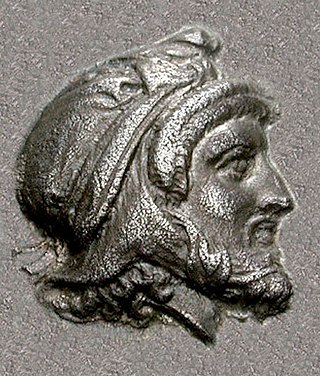
Pharnabazus II was a Persian soldier and statesman, and Satrap of Hellespontine Phrygia. He was the son of Pharnaces II of Phrygia and grandson of Pharnabazus I, and great-grandson of Artabazus I. He and his male ancestors, forming the Pharnacid dynasty, had governed the satrapy of Hellespontine Phrygia from its headquarters at Dascylium since 478 BC. He married Apama, daughter of Artaxerxes II of Persia, and their son Artabazus also became a satrap of Phrygia. According to some accounts, his granddaughter Barsine may have become Alexander the Great's concubine.
The Thirty Tyrants were a pro-Spartan oligarchy installed in Athens in 404 BC, after the Athenian democracy had been defeated by Sparta in the Peloponnesian War. Upon Lysander's request, the Thirty were elected as a tyrannical government, not just as a legislative committee. Although they maintained power for only a brief eight months, their reign resulted in the killing of 5% of the Athenian population, the confiscation of citizens' property and the exile of other democratic supporters. They became known as the "Thirty Tyrants" because of their cruel and oppressive tactics. The two leading members were Critias and Theramenes.
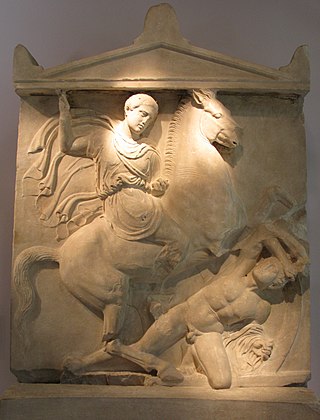
The Corinthian War was a conflict in ancient Greece which pitted Sparta against a coalition of city-states comprising Thebes, Athens, Corinth and Argos, backed by the Achaemenid Empire. The war was caused by dissatisfaction with Spartan imperialism in the aftermath of the Peloponnesian War, both from Athens, the defeated side in that conflict, and from Sparta's former allies, Corinth and Thebes, who had not been properly rewarded. Taking advantage of the fact that the Spartan king Agesilaus II was away campaigning in Asia against the Achaemenid Empire, Thebes, Athens, Corinth and Argos forged an alliance in 395 BC with the goal of ending Spartan hegemony over Greece; the allies' war council was located in Corinth, which gave its name to the war. By the end of the conflict, the allies had failed to end Spartan hegemony over Greece, although Sparta was durably weakened by the war.

Theban Hegemony
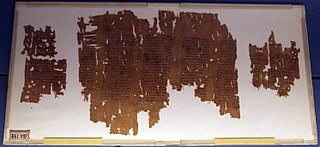
Hellenica simply means writings on Greek (Hellenic) subjects. Several histories of 4th-century Greece, written in the mould of Thucydides or straying from it, have borne the conventional Latin title Hellenica. The surviving Hellenica is an important work of the Ancient Greek writer Xenophon and one of the principal sources for the last seven years of the Peloponnesian War not covered by Thucydides, as well as the war's aftermath.
The Battle of Haliartus was fought in 395 BC between Sparta and Thebes. The Thebans defeated a Spartan force attempting to seize the town of Haliartus, killing the Spartan leader Lysander. The battle marked the start of the Corinthian War, which continued until 387 BC.
Thrasyllus was an Athenian strategos (general) and statesman who rose to prominence in the later years of the Peloponnesian War. First appearing in Athenian politics in 410 BC, in the wake of the Athenian coup of 411 BC, he played a role in organizing democratic resistance in an Athenian fleet at Samos. There, he was elected strategos by the sailors and soldiers of the fleet, and held the position until he was controversially executed several years later after the Battle of Arginusae.

The Battle of Nemea, also known in ancient Athens as the Battle of Corinth, was a battle in the Corinthian War, between Sparta and the coalition of Argos, Athens, Corinth, and Thebes. The battle was fought in Corinthian territory, at the dry bed of the Nemea River. The battle was a decisive Spartan victory, which, coupled with the Battle of Coronea later in the same year, gave Sparta the advantage in the early fighting on the Greek mainland.

The idea of the Common Peace was one of the most influential concepts of 4th century BC Greek political thought, along with the idea of Panhellenism. The term described both the concept of a desirable, permanent peace between the Greek city-states (poleis) and a sort of peace treaty which fulfilled the three fundamental criteria of this concept: it had to include all the Greek city-states, it had to recognise the autonomy and equality of all city states without regard for their military power, and it had to be intended to remain in force permanently.
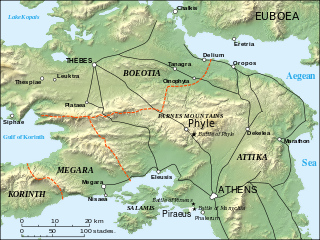
The Battle of Phyle was fought between Athenian exiles who were seeking to restore democracy to Athens and a Spartan garrison trying to protect the oligarchic Thirty Tyrants. In the battle, 700 Athenian exiles under Thrasybulus decisively defeated Spartans and their Athenian cavalry in a dawn ambush.

The Battle of Munychia was fought between Athenians exiled by the oligarchic government of the Thirty Tyrants and the forces of that government, supported by a Spartan garrison. In the battle, a substantially superior force composed of the Spartan garrison of Athens and the army of the oligarchic government attacked a hill in Piraeus which had been seized by 1,000 exiles under Thrasybulus, but was defeated. After this defeat, the Thirty Tyrants were forced to flee to Eleusis.

The Battle of Piraeus was fought in 403 BC between Athenian exiles who had defeated the government of the Thirty Tyrants and occupied Piraeus and a Spartan force sent to combat them. In the battle, the Spartans narrowly defeated the exiles, with both sides suffering appreciable casualties. After the battle, Pausanias arranged a settlement between the two parties which allowed the reestablishment of democratic government in Athens.
The Arcadian League was a league of city-states in ancient Greece. It combined the various cities of Arcadia, in the Peloponnese, into a single state. The league was founded in 370 BC, taking advantage of the decreased power of Sparta, which had previously dominated and controlled Arcadia. Mantinea, a city that had suffered under Spartan dominance, was particularly prominent in pushing for its founding. The league was responsible for the foundation of Megalopolis.

Phlius or Phleius (Φλειοῦς) was an independent polis (city-state) in the northeastern part of Peloponnesus. Phlius' territory, called Phliasia (Φλιασία), was bounded on the north by Sicyonia, on the west by Arcadia, on the east by Cleonae, and on the south by Argolis. This territory is a small valley about 900 feet (270 m) above the level of the sea, surrounded by mountains, from which streams flow down on every side, joining the river Asopus in the middle of the plain. The mountain in the southern part of the plain, from which the principal source of the Asopus springs, was called Carneates (Καρνεάτης). The territory of Phlius was celebrated in antiquity for its wine. According to Strabo, the ancient capital of the country was Araethyrea (Ἀραιθυρέα) on Mt. Celosse, which city is mentioned by Homer; but the inhabitants subsequently deserted it and built Phlius at the distance of 30 stadia. Pausanias, however, does not speak of any migration, but says that the ancient capital was named Arantia (Ἀραντία), from its founder Aras, an autochthon, that it was afterwards called Araethyrea from a daughter of Aras, and that it finally received the name of Phlius, from Phlias, a son of Ceisus and grandson of Temenus. The name of Arantia was retained in the time of Pausanias in the hill Arantinus, on which the city stood. Hence the statement of grammarians that both Arantia and Araethyrea were ancient names of Phlius. According to Stephanus of Byzantium, Phlius derived its name from Dionysus and Chthonophyle. Phlius was subsequently conquered by Dorians under Rhegnidas, who came from Sicyon. Some of the inhabitants migrated to Samos, others to Clazomenae; among the settlers at Samos was Hippasus, from whom Pythagoras derived his descent.
The Second Athenian League was a maritime confederation of Aegean city-states from 378 to 355 BC and headed by Athens, primarily for self-defense against the growth of Sparta and secondly, the Persian Empire.

The Theban–Spartan War of 378–362 BC was a series of military conflicts fought between Sparta and Thebes for hegemony over Greece. Sparta had emerged victorious from the Peloponnesian War against Athens, and occupied an hegemonic position over Greece. However, the Spartans' violent interventionism upset their former allies, especially Thebes and Corinth. The resulting Corinthian War ended with a difficult Spartan victory, but the Boeotian League headed by Thebes was also disbanded.
References
- Fine, John V.A. The Ancient Greeks: A critical history (Harvard University Press, 1983) ISBN 0-674-03314-0
- Xenophon (1890s) [original 4th century BC]. . Translated by Henry Graham Dakyns – via Wikisource.